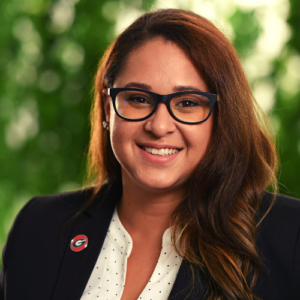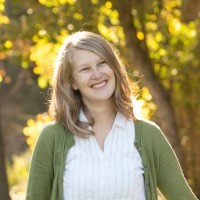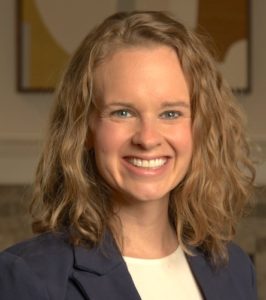From the use of interracial couples in marketing to a hiring process equitable for people of diverse economic backgrounds to how corporations can address climate change, the three winners of the 2022 Business for a Better World Dissertation Proposal competition personify how business research can be used to create a better world.
The Colorado State University College of Business will give each of these scholars $6,000 to continue their work, and present their research during the Business for a Better World Research Symposium on Sept. 23.
Learn more about the three winners below.
 Nicole Davis
Nicole Davis
Terry College of Business, University of Georgia
Dissertation title: “Do consumers respond positively to all representations of diversity in marketing?”
Advisers: Julio Sevilla and Rosanna Smith
For her dissertation, Nicole Davis examines how consumers receive marketing campaigns featuring interracial vs. same-race couples, and how it influences their perceptions of a given brand.
“This research started because I’m part of an interracial couple,” she said, “and I’ve had some experiences with my husband that I know are different.”
Davis said she found that consumers actually have better perceptions about ads featuring couples who are mixed-race or who are both from minority populations. She said this information should give companies more incentive to include diversity in their marketing.
“Representation is important, and that’s what I’m hoping to show in my research,” Davis said.
 Angie Fairchild
Angie Fairchild
UNC Kenan-Flager Business School
Dissertation title: “Essays on corporate climate change mitigation”
Angie Fairchild originally wanted to conduct public health research, but an incident closer to home made her realize how much power businesses have over local communities.
“This really hit home when some scientists in my hometown discovered that a chemicals company had been knowingly and deliberately dumping toxins into my water supply,” she said. “I was so angry, but also curious about how they came to be. How can so much power over human lives ultimately rest in the hands of company-level self-regulation?”
This is what led Fairchild to study the intersection of sustainability and management, and led to the topic of her dissertation. It focuses on what companies are doing to reduce their greenhouse gas emissions and the motivations behind these actions, as well as the growing cohort of companies working to remove emissions from the ambient air.
“I hope this study helps us understand how companies collaborate to resolve these huge challenges, both to hasten the great work being done in carbon removals, as well as to pave the way for future climate tech solutions that may be in a similar place in the future,” Fairchild said.
 Kristie Moergen
Kristie Moergen
Sam M. Walton College of Business, University of Arkansas
Dissertation title: “Same and cross-class interactions during employment interviews”
Before working toward a Ph.D. in management, Kristie Moergen studied as a counselor and, as a part of her training, worked with elementary school students, where she was struck by the extent to which students’ social class impacted what they imagined for their future careers.
“Our conversations highlighted the impact of students’ social class backgrounds and the unique strengths and challenges that different amounts of access to social, economic, and cultural capital facilitated,” Moergen said.
In part, this is what led her to study how same- and cross-class interactions between employers and job candidates impact selection outcomes, including employers’ assessments of hireability, salary recommendations and willingness to work with a job candidate.
“Research suggests that life in a lower social class equips people to be more interdependent and responsive to others’ needs, and, on average, to work better in groups, among other things. This has key implications for the workplace,” she said.
Her hope is that her research will help businesses see the potential in a hiring process that values diversity in social class and avoid relying on “gut feelings” that might unintentionally contribute to labor market disadvantage for job candidates from the lower social class.
“The hope is to prompt employers to be more thoughtful about designing their selection systems and to train their recruiters and hiring managers regarding social class,” she said.
About CSU’s College of Business
The College of Business at Colorado State University is focused on using business to create a better world.
As an AACSB-accredited business school, the College is among the top five percent of business colleges worldwide, providing programs and career support services to more than 2,500 undergraduate and 1,300 graduate students. Faculty help students across our top-ranked on-campus and online programs develop the knowledge, skills and values to navigate a rapidly evolving business world and address global challenges with sustainable business solutions. Our students are known for their creativity, work ethic and resilience—resulting in an undergraduate job offer and placement rate of over 90% within 90 days of graduation.
The College’s highly ranked programs include its Online MBA, which has been ranked the No. 1 program in Colorado by U.S. News and World Report for five years running and achieved No. 16 for employability worldwide from QS Quacquarelli Symonds. The College’s Impact MBA is also ranked by Corporate Knights as a Top 20 “Better World MBA” worldwide.